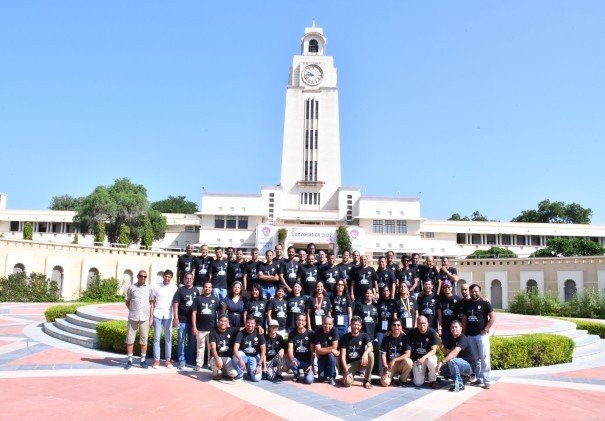The pursuit of B.Tech education is witnessing a significant surge in India. These institutions offer top-notch education, infrastructure, facilities, and placement opportunities, contributing to the formation of skilled engineers domestically and globally. B.Tech, an engineering course, offers various specializations such as mechanical, computer science, electronics and communication, civil, and electrical, among others.
Table of Contents
[btn_block id=341]
Affordable B.Tech Colleges in India (2024)
In the requirement of higher education, the pursuit of a B.Tech degree is a significant milestone for many aspiring engineers in India. As the demand for skilled professionals in various engineering fields continues to rise, the importance of affordable B.Tech colleges cannot be overstated.

In 2024, students across the country have access to a range of institutions that offer quality education at reasonable fees, paving the way for a brighter future in engineering. These affordable B.Tech colleges not only provide students with the necessary knowledge and skills but also offer opportunities for personal and professional growth. As the engineering industry evolves, these institutions play a crucial role in shaping the next generation of engineers who will drive innovation and progress in India and beyond.
| Name of College/University | Fees |
|---|---|
| AIACTR Delhi | Rs. 1.60 lakhs |
| JMI New Delhi | Rs. 0.64 lakhs |
| IGDTUW Delhi | Rs. 4.04 lakhs |
| SRM University Chennai | Rs. 2.00 lakhs |
| Sathyabama University | Rs. 1.00 lakhs |
| Maulana Abul Kalam Azad University, Kolkata | Rs. 1.92 lakhs |
| Aliah University, Kolkata | Rs. 0.52 lakhs |
| JNTUHCEH Hyderabad | Rs. 0.82 lakhs |
| University College of Engineering, Osmania University, Hyderabad | Rs. 0.81 lakhs |
| DYPCOE Ambi – DY Patil College of Engineering | Rs. 3.10 lakhs |
Why Consider Affordable B.Tech Colleges in India?
Engineering holds a prominent position among professional fields in India, attracting ambitious science students. However, the journey to top B.Tech colleges demands dedication and focus due to intense competition. Despite the high costs associated with engineering education, several affordable B.Tech colleges offer quality education across India’s regions.
Choosing affordable B.Tech colleges in India offers several compelling reasons for aspiring engineers:
- Accessible Education: Affordable colleges provide access to quality engineering education for students from diverse socioeconomic backgrounds, ensuring that financial constraints do not hinder academic pursuits.
- Reduced Financial Burden: Opting for an affordable college helps students avoid excessive student loan debt, allowing them to start their careers with financial stability and flexibility.
- Equal Opportunity: Affordable colleges prioritize merit and potential over financial status, offering equal opportunities for all students to pursue their engineering aspirations based on academic merit rather than financial resources.
- Quality Education: Many affordable colleges in India maintain high academic standards and accreditation, ensuring that students receive a quality education comparable to more expensive institutions.
- Industry Exposure: Affordable colleges often collaborate with industry partners and offer practical training and internships, providing students with valuable industry exposure and hands-on experience.
- Career Prospects: Graduates from affordable B.Tech colleges have ample career prospects, as employers typically prioritize skills, knowledge, and experience over the prestige of the institution.
- Personal Growth: Studying in an affordable college fosters resilience, resourcefulness, and determination, nurturing students’ personal growth and character development along with their academic pursuits.
- Contribution to Society: By choosing affordable education, students contribute to promoting inclusivity and social equity in the education system, thereby fostering a more equitable and accessible society.
Overall, considering affordable B.Tech colleges in India empowers students to pursue their engineering dreams without financial constraints while receiving a quality education and preparing for successful careers in the dynamic field of engineering.
Popular B.Tech Examinations
- JEE Main
- JEE Advanced
- WBJEE
- MHT CET
- BITSAT
- VITEEE
- SRMJEE

Eligibility Criteria for Affordable B.Tech Colleges in India (2024)
In 2024, aspiring engineering students in India must meet certain eligibility criteria to gain admission to affordable B.Tech colleges. These criteria serve as the foundation for selecting candidates who possess the necessary academic background and potential to excel in their chosen field. Generally, eligibility requirements may include:
- Academic Qualifications:
- Completion of 12th-grade education with a science background.
- Minimum aggregate marks, typically around 60%, in relevant subjects like Physics, Chemistry, and Mathematics.
- Entrance Examinations:
- Qualification in national or state-level entrance exams such as JEE Main, JEE Advanced, WBJEE, MHT CET, BITSAT, or others as specified by individual colleges.
- Performance in these exams often determines eligibility for admission and may also influence scholarship opportunities.
- Specific Course Requirements:
- Depending on the specialization sought, additional prerequisites may apply, such as prior coursework in certain subjects or completion of related diploma programs.
- Reservation Criteria:
- Adherence to reservation policies mandated by the government, which may include quotas for certain categories such as SC/ST/OBC and economically weaker sections (EWS).
- Other Considerations:
- Some colleges may have specific eligibility criteria related to domicile status, age limits, or physical fitness requirements.
By meeting these eligibility criteria, aspiring engineers can position themselves for admission to affordable B.Tech colleges in India, setting the stage for a promising academic journey and future career prospects.
Also Read: How Much Percentile for NIT Admission in 2024? Past Year Cutoff Trends
Application Process for Affordable B.Tech Colleges in India (2024)
The application process for top B.Tech colleges is straightforward:
- Take required entrance exams as per college guidelines.
- Fill and submit application forms within deadlines.
- Await release of cutoff lists.
- If applicable, appear for JEE Advanced after passing JEE Main.
- Complete admission formalities upon selection.
Placement Details of Affordable B.Tech Colleges in India (2024)
| Name of College/University | Median Salary |
|---|---|
| AIACTR Delhi | Rs. 4.34 lakhs |
| JMI New Delhi | Rs. 6.60 lakhs |
| IGDTUW Delhi | Rs. 9.00 lakhs |
| SRM University Chennai | Rs. 3.60 lakhs |
| Sathyabama University | Rs. 3.25 lakhs |
| Maulana Abul Kalam Azad University, Kolkata | Rs. 3.60 lakhs |
| Aliah University, Kolkata | Rs. 3.00 lakhs |
| JNTUHCEH Hyderabad | Rs. 6.00 lakhs |
| University College of Engineering, Osmania University, Hyderabad | Rs. 6.60 lakhs |
| DYPCOE Ambi – DY Patil College of Engineering | Rs. 4.12 lakhs |
Popular B.Tech Specializations
In the realm of engineering education, there are several popular specializations that attract students seeking diverse career opportunities. These B.Tech specializations cater to various interests and industry demands, offering pathways to specialized knowledge and skills. Some of the most sought-after B.Tech specializations in India include:
- Computer Science and Engineering (CSE): This specialization focuses on the study of computer systems, software development, algorithms, and programming languages, preparing students for careers in software engineering, data analysis, artificial intelligence, and cybersecurity.
- Electrical Engineering: Electrical engineering deals with the study of electricity, electromagnetism, and electronics, providing students with the knowledge to design, develop, and maintain electrical systems, power generation, and distribution networks.
- Mechanical Engineering: Mechanical engineering encompasses the study of machinery, materials, thermodynamics, and manufacturing processes, equipping students with the skills to design, analyze, and optimize mechanical systems and components in industries such as automotive, aerospace, and energy.
- Civil Engineering: Civil engineering focuses on the design, construction, and maintenance of infrastructure projects such as buildings, roads, bridges, dams, and water supply systems, offering opportunities in construction companies, government agencies, and consulting firms.
- Electronics and Communication Engineering (ECE): ECE involves the study of electronic devices, circuits, communication systems, and signal processing techniques, preparing students for careers in telecommunications, embedded systems, semiconductor technology, and networking.
- Biomedical Engineering: Biomedical engineering integrates principles of engineering and biology to develop innovative healthcare technologies, medical devices, and diagnostic tools, addressing challenges in areas such as medical imaging, prosthetics, tissue engineering, and biomedical instrumentation.
- Aerospace Engineering: Aerospace engineering focuses on the design, development, and testing of aircraft, spacecraft, and related systems, offering opportunities in aerospace companies, defense organizations, and research institutions.
- Chemical Engineering: Chemical engineering involves the study of chemical processes, materials, and reactions, enabling students to work in industries such as petrochemicals, pharmaceuticals, food processing, and environmental engineering.
- Environmental Engineering: Environmental engineering addresses issues related to pollution control, waste management, sustainable development, and environmental conservation, offering career opportunities in consulting firms, government agencies, and environmental research organizations.
- Biotechnology Engineering: Biotechnology engineering combines principles of biology and engineering to develop biotechnological processes, products, and applications in areas such as healthcare, agriculture, pharmaceuticals, and biomanufacturing.
These popular B.Tech specializations cater to diverse interests and career aspirations, providing students with the opportunity to pursue rewarding and impactful careers in various sectors of the economy.
Should I Compromise with Branch or College?
Deciding whether to compromise on the choice of branch or college depends on various factors and individual priorities. Here are some considerations to help you make an informed decision:
- Career Goals: Evaluate which aspect is more critical for your long-term career aspirations. If your career goals are specific to a particular branch of engineering, compromising on the college might be preferable. Conversely, if the reputation and resources of a specific college are essential for your career advancement, compromising on the branch could be the better option.
- Academic Interests: Consider your interests and strengths in different engineering branches. If you have a strong preference for a particular branch and are passionate about pursuing it, compromising on the college might be worthwhile. However, if you are open to exploring different branches and prioritize the overall quality of education, compromising on the branch might be acceptable.
- Employability and Opportunities: Research the job market and industry demand for different engineering branches. Determine which branches offer better employment prospects and align with your career goals. Choosing a branch with higher demand in the job market could outweigh the prestige of the college.
- Financial Considerations: Evaluate the financial implications of your decision. Consider the tuition fees, living expenses, and potential return on investment from your chosen branch and college. If affordability is a significant concern, compromising on either branch or college to minimize financial burden may be necessary.
- Personal Preferences: Reflect on your personal preferences, such as location, campus culture, faculty-student ratio, extracurricular activities, and campus facilities. These factors can significantly impact your overall college experience and well-being.
Ultimately, there is no one-size-fits-all answer, and the decision should align with your individual priorities, goals, and circumstances. It may be helpful to seek guidance from mentors, career counselors, and family members to weigh the pros and cons of each option before making a decision.
Low Ranking Accepting B.Tech Colleges in India
In India, there are several B.Tech colleges that accept students with lower rankings in entrance examinations. These colleges provide opportunities for aspiring engineers who may not have secured high ranks but still possess the passion and potential to excel in their chosen field.
Despite fierce competition and high cutoffs in prestigious institutions, these colleges offer a pathway for students to pursue their engineering education and build successful careers. By prioritizing factors beyond just entrance exam scores, such as individual merit, determination, and dedication, these colleges contribute to fostering a diverse and inclusive engineering community in India.
These colleges mentioned below accept low rankings:
- Trinity Academy of Engineering, Pune
- Sinhgad Academy of Engineering, Kondhwa
- KMIT Hyderabad
- CMRCET Hyderabad
- CMR University, Bangalore
- MSRUAS Bangalore
- New Horizon College of Engineering, Bangalore
- Guru Premsukh Memorial College of Engineering, Delhi
- CBS Group of Institutions, Delhi
- Sri Lakshmi Ammal Engineering College, Chennai
Conclusion
In conclusion, the pursuit of a B.Tech degree in India offers a plethora of opportunities for aspiring engineers. With the availability of affordable colleges offering quality education and diverse specializations, students have the chance to pursue their academic and career aspirations without being burdened by exorbitant fees.
Additionally, the engineering field in India continues to thrive, offering promising job prospects and contributing to technological advancements both nationally and globally. By making informed decisions about entrance exams, specializations, and college choices, aspiring engineers can embark on a rewarding journey towards fulfilling their professional aspirations in the dynamic field of engineering.




![100% Working PW MOD APK & Study Rays APK Download – [v1.5] Latest Version](https://studyratna.co/wp-content/uploads/2025/05/maxresdefault-1.jpg)




